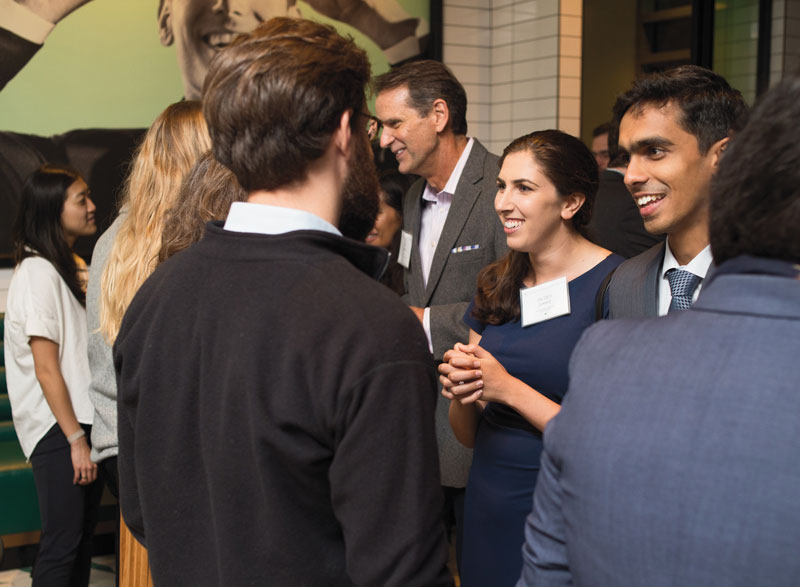Late in the fall of 2019, 10 talented second-year MBA students from 10 top-tier programs across the country tackled the notion of social identity. Working independently from their perches in Philadelphia (The Wharton School, University of Pennsylvania), Durham, North Carolina (Fuqua School of Business, Duke University), and elsewhere, the McGowan Fellows explored layers of their own social identity. Some aspects of identity were given (gender, for instance); some had been chosen (e.g., highly educated); and others were core and enduring (e.g., creative).
Now the hard questions. In their careers and personal lives, which of these attributes were likely to boost the capacity to lead? Which could get in the way? Which of the attributes could vary in their impact on leadership depending on the situation?
Does being female boost or inhibit the capacity to lead? Is being highly educated always a plus? Can being creative or being seen as creative derail some situations?
The answers were personal, social, cultural, dynamic, and intrepid, and they served as the first steps in a newly designed curriculum aimed at developing principled leaders. These are leaders who communicate across social identities, who learn and share their learnings, who step up to problems, who display empathy. In facing decisions, in leading teams, they embrace and employ six characteristics: accountability, character and integrity, courage, empathy, resilience, and self-awareness.
Or, as the staff and board members of the McGowan Fund often ask one another as they face a decision, “What would Bill do?”
He would do the right thing. That’s why William “Bill” McGowan is more than a namesake; he is the Fund’s North Star. He certainly would have liked the new Fellows curriculum, in part because it’s so well-timed, as leaders here in the U.S. and abroad find themselves faltering in our VUCA world (VUCA stands for volatility, uncertainty, complexity, and ambiguity). But actually, the Fund’s drive to develop principled leaders dates back to a time long before. It reaches back to McGowan’s own life, and the company he built—and what happened after.
William G. McGowan was already an accomplished investor and consultant in 1968 when he met John D. Goeken, an Illinois entrepreneur who sold mobile radios. Goeken was trying to build a microwave system between St. Louis and Chicago. But Goeken had been blocked by the Federal Communications Commission out of concerns for AT&T, a government-sanctioned communications monopoly, and he was nearly bankrupt. McGowan invested $50,000, renamed the company to MCI Communications Group, launched his titan battle with AT&T, and changed the world’s business landscape. Soon after, the landscape also changed for MCI, which lost value now that it was openly competing with AT&T and others across services. After recovering from a major heart attack, McGowan returned to MCI and reestablished profitability.
MCI was an invigorating place to work. According to former employees, it had the drive of a start-up and a loose corporate culture that encouraged inquiry. Known for working 15-hour days and drinking 12 cups of coffee daily (until his heart attack), McGowan had an open-door policy. He also exercised values-based decision-making—a practice that his successors did not adopt.
The first successor was Bert C. Roberts, hand-picked by McGowan, who retired and died soon after. Roberts may have knowingly presided over money laundering and other illegal activities; he eventually engineered a merger with WorldCom, which was led by Bernie Ebbers. Ebbers led MCI WorldCom with a potent mix of opaque decision-making and vigorous fraud, amounting to $11 billion. The company collapsed, and 30,000 employees lost their jobs. The impact steamrolled: Lucent Technologies, Nortel Networks, Corning, and other suppliers saw big layoffs and depressed share prices. Not surprisingly, when WorldCom emerged from bankruptcy, it took the less sullied MCI name—the name of William McGowan’s brainchild.
To say he would have been disappointed with this chain of events is an understatement. He would have been deeply troubled, given his values. When the Fund was founded in 1993, it supported access to business education with multiple scholarships. Then came the 2009 financial crisis, another world-shaking demonstration of bad behavior, and the McGowan Fellows Program—with its full-year scholarship, symposium on business ethics, and commitment to principled leadership—was born.
“I think the McGowan principles are relevant across all settings,” alumna Nicole Bell (Booth School of Business, University of Chicago, 2016) notes. In the past, the principles appeared to apply primarily to nonprofits, she says, but “I think that’s starting to change, especially around what an organization’s values are in terms of racial inequity. In my mind, if values are not talked about, they’re not real.” This year, Bell, who leads projects for the Boston Consulting Group, coached McGowan Fellow Val Zhao (Sloan School of Management, MIT, 2020) through those first tough social identity questions and beyond. As part of the program, alumni coaches offer every Fellow one-on-one sessions, reflecting the six principles and day-to-day experiences and decisions.
“We very much stuck to the coaching model,” Zhao recalls. “A lot of conversations went down the lines of ‘In retrospect, what could have gone better in this situation? What were you thinking in that moment? What are other ways you could have approached the problem?’”
In fact, Zhao, who works in the digital practice at McKinsey & Company, kind of misses the coaching. “I don’t know why employers don’t offer it and people don’t invest in it,” she says.
Indeed. Looking back to the WorldCom debacle, it’s worth noting that a lone woman named Cynthia Cooper noticed irregularities and raised questions with the company’s audit committee. Without encouragement, she pursued her principles, leading a team of internal auditors, one of whom worked at night and bought his own CD burner to copy records. Cooper was named a Person of the Year by Time magazine, and the man who spearheaded the fraud, Bernie Ebbers, was sentenced to 25 years in prison.
It’s a lesson for VUCA times and for all other times, too. As Bill knew all those years ago, principles matter.

